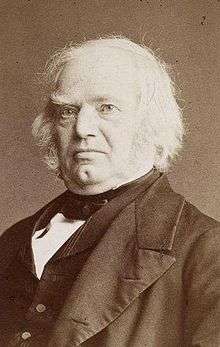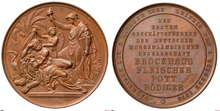August Friedrich Pott
August Friedrich Pott (14 November 1802 in Nettelrede, Hanover – 5 July 1887 in Halle) was a German pioneer in linguistics.

Pott was a theology student at the University of Göttingen, where he became interested in philology. He became a schoolmaster in Celle,[1] but completed his doctoral dissertation in 1827 and went to the University of Berlin to study with Franz Bopp, an important pioneer in Indo-European linguistics. He became an unsalaried lecturer in general linguistics there in 1830 and became the professor of general linguistics at the University of Halle in 1833, where he remained for the rest of his life.

In 1870 he received a combined medal (together with (Brockhaus, Fleischer and Rödiger) in occasion of the 25th anniversary of the DMG.[2]
His works, notably Etymologische Forschungen (1834–1836),[1] established the modern etymological studies on the basis of the correspondence of sounds occurring in related words in the Indo-European languages.
The first volume appeared in two volumes, and the second edition (1841-76) was expanded to six volumes.[3] He is also considered the nineteenth century's most important philologist of Romany, the language of the Romani people.
References
- Chisholm, Hugh, ed. (1911). . Encyclopædia Britannica. 22 (11th ed.). Cambridge University Press. p. 210.
- http://hdl.handle.net/10900/100742 S. Krmnicek und M. Gaidys, Gelehrtenbilder. Altertumswissenschaftler auf Medaillen des 19. Jahrhunderts. Begleitband zur online-Ausstellung im Digitalen Münzkabinett des Instituts für Klassische Archäologie der Universität Tübingen, in: S. Krmnicek (Hrsg.), Von Krösus bis zu König Wilhelm. Neue Serie Bd. 3 (Tübingen 2020), 35-37.
- Yakob Malkiel, Etymology, pp. 12-14.